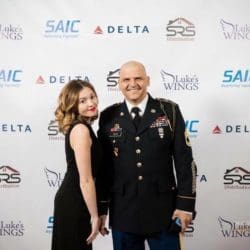Caregivers who are "children" need help too.
What moment did you realize you were a caregiver?
When my father arrived at Walter Reed National Military Medical Center and I saw the extent of his injuries for myself. His care team told me that he needed someone to take care of him. I never thought a month would turn into spending two years with him in the hospital and ongoing after he retired.
What does being a military caregiver mean to you?
Being a military caregiver means you are an advocate, a planner and a live-in medical attendant. My father likes to say that I am his life support and his life line because I can read how he’s feeling better than he can express his words.
How have you changed since becoming a military caregiver?
Although my father is married, my mother didn’t offer to be my father’s caregiver. It was my obligation as his daughter and an American citizen to help my father who was in need of assistance. One of the most significant things I’ve learned is how to fight for what the veteran needs, and make sure those needs get fulfilled.

My Story
Sonia is a military caregiver for her father, Luciano, a combat veteran who served in both Operation Iraqi Freedom and Operation Enduring Freedom. When Sonia got the news that her father got hurt in Afghanistan, for what she thought was just a severe leg injury, she was relieved that it wasn't more and he was alive. It was only when she got to Walter Reed National Military Center when she noticed there were more issues at hand. These issues were not immediately obvious to the team of doctors he had since they did not know him before his injuries. As Sonia spent more time with her father, these invisible wounds and other injuries that weren't immediately identified soon manifested right before her eyes. Soon, a litany of issues, recognizable to the universal caregiver, the military caregiver family arose: post traumatic stress disorder (PTSD), traumatic brain injury (TBI), hearing loss, fatigue, balance problems, severe injuries, and chronic illness.
In her role as a Dole Caregiver Fellow, Sonia hopes to shed more light on the mental health issues faced by caregivers and their families, especially military children. Being a caregiver who is a child of a service member is something that not many understand and respect. This is not only because of Sonia's age but mostly, in her opinion, because she is the child of a service member and not the usual spouse or parent being the caregiver. Sonia wants to help people get a better understanding of what veterans need and make it happen.








